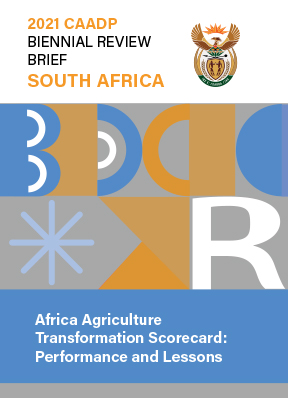Africa Agriculture Transformation Scorecard: performance and lessons. South Africa
Abstract
The Malabo Declaration on accelerated agricultural growth and transformation for shared prosperity and improved livelihoods is a set of goals that were adopted by Heads of State and Government of the African Union in 2014 in Malabo, Equatorial Guinea (AUC 2014). To translate the seven Malabo commitments into results, a call for action was made by the Heads of State and Governments, by calling upon the AU Commission and the NEPAD Planning and Coordinating Agency, in collaboration with partners, to initiate a review process to be conducted on a biennial basis starting 2017, with an objective of tracking, measuring, and reporting progress towards achieving the Malabo Declaration commitments by 2025.
Three Biennial Reviews (BR) have been conducted—the inaugural BR in 2017, the second BR in 2019, and the third and most recent BR in 2021. This brief draws on the third BR report to summarize the performance of South Africa in pursuit of the seven Malabo Declaration commitments and assesses the challenges faced and the lessons learned by the country.
South Africa is considered not on track to achieve the Malabo commitments by 2025. Moreover, the overall performance score for South Africa has been relatively stagnant, if not declining, across the successive BRs, with the lowest performance registered in the second BR.
A key recommendation from the analysis is for South Africa to improve on the overall CAADP process and the CAADP-based policy and institutional support system. The country fell short on most indicators relating to this commitment, including the CAADP process completion index; the existence and the quality of a multi-sector and multi-stakeholder coordination body; and having in place evidence-based policies, supportive institutions, and corresponding human resources required.

